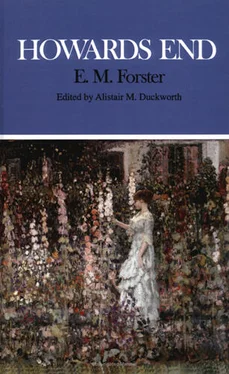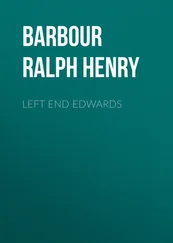Edward Morgan Forster - Howards End
Здесь есть возможность читать онлайн «Edward Morgan Forster - Howards End» весь текст электронной книги совершенно бесплатно (целиком полную версию без сокращений). В некоторых случаях можно слушать аудио, скачать через торрент в формате fb2 и присутствует краткое содержание. Жанр: Классическая проза, на английском языке. Описание произведения, (предисловие) а так же отзывы посетителей доступны на портале библиотеки ЛибКат.
- Название:Howards End
- Автор:
- Жанр:
- Год:неизвестен
- ISBN:нет данных
- Рейтинг книги:3 / 5. Голосов: 1
-
Избранное:Добавить в избранное
- Отзывы:
-
Ваша оценка:
- 60
- 1
- 2
- 3
- 4
- 5
Howards End: краткое содержание, описание и аннотация
Предлагаем к чтению аннотацию, описание, краткое содержание или предисловие (зависит от того, что написал сам автор книги «Howards End»). Если вы не нашли необходимую информацию о книге — напишите в комментариях, мы постараемся отыскать её.
Howards End — читать онлайн бесплатно полную книгу (весь текст) целиком
Ниже представлен текст книги, разбитый по страницам. Система сохранения места последней прочитанной страницы, позволяет с удобством читать онлайн бесплатно книгу «Howards End», без необходимости каждый раз заново искать на чём Вы остановились. Поставьте закладку, и сможете в любой момент перейти на страницу, на которой закончили чтение.
Интервал:
Закладка:
Helen, agreeing here, disagreeing there, would have talked till midnight, but Margaret, with her packing to do, focussed the conversation on Henry. She might abuse Henry behind his back, but please would she always, be civil to him in company? "I definitely dislike him, but I'll do what I can," promised Helen. "Do what you can with my friends in return."
This conversation made Margaret easier. Their inner life was so safe that they could bargain over externals in a way that would have been incredible to Aunt Juley, and impossible for Tibby or Charles. There are moments when the inner life actually "pays," when years of self-scrutiny, conducted for no ulterior motive, are suddenly of practical use. Such moments are still rare in the West; that they come at all promises a fairer future. Margaret, though unable to understand her sister, was assured against estrangement, and returned to London with a more peaceful mind.
The following morning, at eleven o'clock, she presented herself at the offices of the Imperial and West African Rubber Company. She was glad to go there, for Henry had implied his business rather than described it, and the formlessness and vagueness that one associates with Africa had hitherto brooded over the main sources of his wealth. Not that a visit to the office cleared things up. There was just the ordinary surface scum of ledgers and polished counters and brass bars that began and stopped for no possible reason, of electric-light globes blossoming in triplets, of little rabbit hutches faced with glass or wire, of little rabbits. And even when she penetrated to the inner depths, she found only the ordinary table and Turkey carpet, and though the map over the fireplace did depict a helping of West Africa, it was a very ordinary map. Another map hung opposite, on which the whole continent appeared, looking like a whale marked out for blubber, and by its side was a door, shut, but Henry's voice came through it, dictating a "strong" letter. She might have been at the Porphyrion, or Dempster's Bank, or her own wine-merchant's. Everything seems just alike in these days. But perhaps she was seeing the Imperial side of the company rather than its West African, and Imperialism always had been one of her difficulties.
"One minute!" called Mr. Wilcox on receiving her name. He touched a bell, the effect of which was to produce Charles.
Charles had written his father an adequate letter—more adequate than Evie's, through which a girlish indignation throbbed. And he greeted his future stepmother with propriety.
"I hope that my wife—how do you do? —will give you a decent lunch," was his opening. "I left instructions, but we live in a rough-and-ready way. She expects you back to tea, too, after you have had a look at Howards End. I wonder what you'll think of the place. I wouldn't touch it with tongs myself. Do sit down! It's a measly little place."
"I shall enjoy seeing it," said Margaret, feeling, for the first time, shy.
"You'll see it at its worst, for Bryce decamped abroad last Monday without even arranging for a charwoman to clear up after him. I never saw such a disgraceful mess. It's unbelievable. He wasn't in the house a month."
"I've more than a little bone to pick with Bryce," called Henry from the inner chamber.
"Why did he go so suddenly?"
"Invalid type; couldn't sleep."
"Poor fellow!"
"Poor fiddlesticks!" said Mr. Wilcox, joining them. "He had the impudence to put up notice-boards without as much as saying with your leave or by your leave. Charles flung them down."
"Yes, I flung them down," said Charles modestly.
"I've sent a telegram after him, and a pretty sharp one, too. He, and he in person is responsible for the upkeep of that house for the next three years."
"The keys are at the farm; we wouldn't have the keys."
"Quite right."
"Dolly would have taken them, but I was in, fortunately."
"What's Mr. Bryce like?" asked Margaret.
But nobody cared. Mr. Bryce was the tenant, who had no right to sublet; to have defined him further was a waste of time. On his misdeeds they descanted profusely, until the girl who had been typing the strong letter came out with it. Mr. Wilcox added his signature. "Now we'll be off," said he.
A motor-drive, a form of felicity detested by Margaret, awaited her. Charles saw them in, civil to the last, and in a moment the offices of the Imperial and West African Rubber Company faded away. But it was not an impressive drive. Perhaps the weather was to blame, being grey and banked high with weary clouds. Perhaps Hertfordshire is scarcely intended for motorists. Did not a gentleman once motor so quickly through Westmoreland that he missed it? and if Westmoreland can be missed, it will fare ill with a county whose delicate structure particularly needs the attentive eye. Hertfordshire is England at its quietest, with little emphasis of river and hill; it is England meditative. If Drayton were with us again to write a new edition of his incomparable poem, he would sing the nymphs of Hertfordshire as indeterminate of feature, with hair obfuscated by the London smoke. Their eyes would be sad, and averted from their fate towards the Northern flats, their leader not Isis or Sabrina, but the slowly flowing Lea. No glory of raiment would be theirs, no urgency of dance; but they would be real nymphs.
The chauffeur could not travel as quickly as he had hoped, for the Great North Road was full of Easter traffic. But he went quite quick enough for Margaret, a poor-spirited creature, who had chickens and children on the brain.
"They're all right," said Mr. Wilcox. "They'll learn—like the swallows and the telegraph-wires."
"Yes, but, while they're learning—"
"The motor's come to stay," he answered. "One must get about. There's a pretty church—oh, you aren't sharp enough. Well, look out, if the road worries you—right outward at the scenery. "
She looked at the scenery. It heaved and merged like porridge. Presently it congealed. They had arrived.
Charles's house on the left; on the right the swelling forms of the Six Hills. Their appearance in such a neighbourhood surprised her. They interrupted the stream of residences that was thickening up towards Hilton. Beyond them she saw meadows and a wood, and beneath them she settled that soldiers of the best kind lay buried. She hated war and liked soldiers—it was one of her amiable inconsistencies.
But here was Dolly, dressed up to the nines, standing at the door to greet them, and here were the first drops of the rain. They ran in gaily, and after a long wait in the drawing-room sat down to the rough-and-ready lunch, every dish in which concealed or exuded cream. Mr. Bryce was the chief topic of conversation. Dolly described his visit with the key, while her father-in-law gave satisfaction by chaffing her and contradicting all she said. It was evidently the custom to laugh at Dolly. He chaffed Margaret, too, and Margaret, roused from a grave meditation, was pleased, and chaffed him back. Dolly seemed surprised, and eyed her curiously. After lunch the two children came down. Margaret disliked babies, but hit it off better with the two-year-old, and sent Dolly into fits of laughter by talking sense to him. "Kiss them now, and come away," said Mr. Wilcox. She came, but refused to kiss them: it was such hard luck on the little things, she said, and though Dolly proffered Chorly-worly and Porgly-woggles in turn, she was obdurate.
By this time it was raining steadily. The car came round with the hood up, and again she lost all sense of space. In a few minutes they stopped, and Crane opened the door of the car.
"What's happened?" asked Margaret.
"What do you suppose?" said Henry.
A little porch was close up against her face.
"Are we there already?"
"We are."
"Well, I never! In years ago it seemed so far away."
Читать дальшеИнтервал:
Закладка:
Похожие книги на «Howards End»
Представляем Вашему вниманию похожие книги на «Howards End» списком для выбора. Мы отобрали схожую по названию и смыслу литературу в надежде предоставить читателям больше вариантов отыскать новые, интересные, ещё непрочитанные произведения.
Обсуждение, отзывы о книге «Howards End» и просто собственные мнения читателей. Оставьте ваши комментарии, напишите, что Вы думаете о произведении, его смысле или главных героях. Укажите что конкретно понравилось, а что нет, и почему Вы так считаете.












